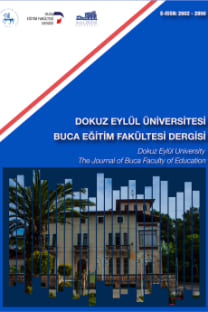Okul Öncesi Eğitim Kurumlarına Devam Eden 5-6 Yaş Çocuklarında Akademik Benlik Saygısı
Bu araştırmanın amacı, okul öncesi eğitime devam eden 5-6 yaş çocuklarının akademik benlik saygısı düzeyi ve bunun çeşitli demografik değişkenler ile ilişkisini saptamaktır. Örneklemi Denizli il merkezinde bulunan 2 özel ve 6 resmi ilköğretim okuluna bağlı anasınıfı ile 2 özel ve 1 kamuya ait bağımsız anaokuluna devam eden toplam 361 çocuk oluşturmuştur. Veriler öğretmen algısına dayalı olarak geliştirilen Akademik Benlik Saygısı Ölçeği ve Kişisel Bilgi Formu aracılığıyla toplanmıştır. Çocukların akademik benlik saygısı düzeyinin ortalamanın altında olduğu; öğretmenin kıdem yılına ve çalıştığı okulun özel veya resmi olup olmamasına ve çocuğun yaşına bağlı olarak değişiklik göstermediği saptanmıştır. Ayrıca kız çocuklarının akademik benlik saygısı düzeyinin erkek çocuklarınkine göre daha düşük olduğu; annenin ve babanın eğitim düzeyi yükseldikçe çocuklarının akademik benlik saygılarının düştüğü; ailenin aylık toplam geliri ile çocuğun akademik benlik saygısı düzeyi arasında ters yönde ilişki olduğu belirlenmiştir. Araştırmada elde edilen bu bulgular eğitimsel açıdan tartışılmış ve uygulayıcılara, ailelere ve araştırmacılara önerilerde bulunulmuştur.
Anahtar Kelimeler:
Okul öncesi eğitim, benlik saygısı, akademik benlik saygısı
The purpose of this study was to determine preschool children's level of academic self-esteem, and its relation with different demographic variables. The sample of this study consisted of 361 preschool and kindergarten children from two private and six state primary school and two private and one state controlled but independent preschools in Denizli. The data were collected by using Academic Self-Esteem Scale developed according to the teachers' perceptions. A form was attached to this scale in order to gather personal information about the participants. The analysis of the scale indicated that most of the children had lower academic self¬esteem than the average. The level of children's academic self-esteem was not related to their teachers' teaching experience, and the type of schools that they worked in (private or state). Additionally, children's academic self-esteem level was not significantly related to their age. Children's gender was significantly related to their level of academic self-esteem. However, as the educational level of parents increased, children's academic self-esteem decreased. As the economic status of parents increased, children's academic self-esteem decreased. In the study, the results were discussed in terms of their educational implications, and recommendations were giyen for educators, parents and researchers.
Keywords:
Early childhood education, self-esteem, academic self-esteem,
- Yayın Aralığı: Yılda 4 Sayı
- Başlangıç: 1992
- Yayıncı: Dokuz Eylül Üniversitesi
Sayıdaki Diğer Makaleler
Candan Erçetin'in Seslendirdiği Şarkıların Gestalt Terapi Açısından Değerlendirilmesi
İlhan YALÇIN, Nilüfer Voltan ACAR
Pozitivist Yaklaşımın Eğitim Yönetimi Alanına Yansıması, Alana Getirdiği Katkı ve Sınırlılıkları
Açık Uçlu Deney Tekniğinin Öğrencilerin Laboratuvara Yönelik Tutumlarına Etkisinin Araştırılması
İnci Alıcı İSEN, Nevzat KAVCAR
Eğitimde Arabuluculuk Ve Okulda Arabuluculuk Sürecinin İşleyişine İlişkin Bir Model
Toni Morrison'dan Sevgiye Gassetvari Bir Bakış
Türkçe Dil Bilgisi Öğretiminde Söz Dizimi ile İlgili Kabuller Üzerine II (Cümle Öğeleri )
Toplumsal Mücadelede Sanatçı Duruşuyla Kathe Kollwitz Ve "The End" (Son) Adlı Eserinin Analizi
